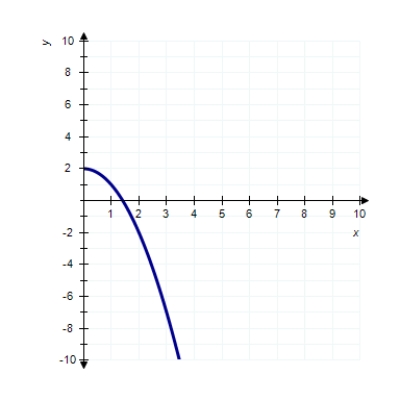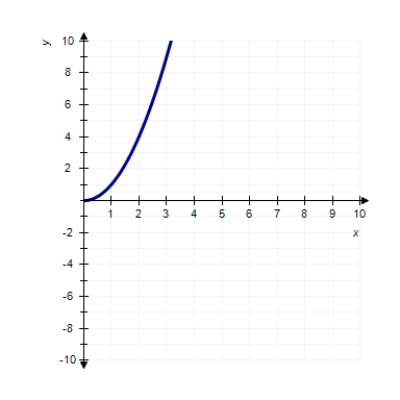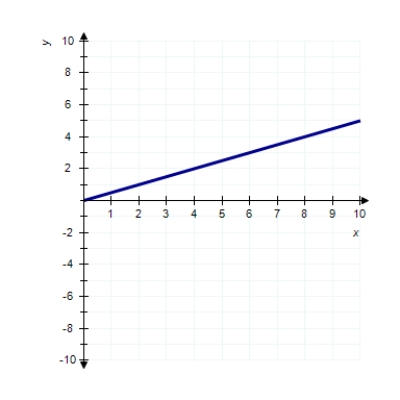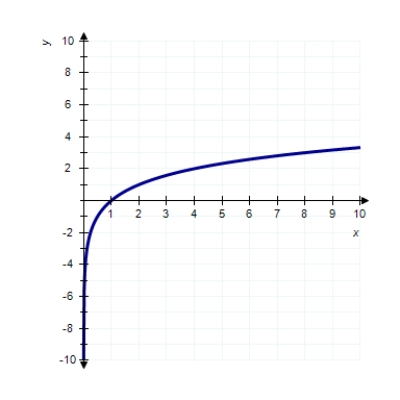Deck 20: Logarithmic Functions
Question
Question
Question
Question
Question
Question
Question
Question
Question
Question
Question
Question
Question
Question
Question
Question
Question
Question
Question
Question
Question
Question
Question
Question
Question
Question
Question
Question
Question
Question
Question
Question
Question
Question
Question
Question
Question
Question
Question
Question
Question

Unlock Deck
Sign up to unlock the cards in this deck!
Unlock Deck
Unlock Deck
1/41
Play
Full screen (f)
Deck 20: Logarithmic Functions
1
The magnitude of earthquake 1 is 4.5, and the magnitude of earthquake 2 is 6.5.How do their intensities compare?
A) Earthquake 1 is 100 times as intense as earthquake 2.
B) Earthquake 1 is 2 times as intense as earthquake 2.
C) Earthquake 2 is 2 times as intense as earthquake 1.
D) Earthquake 2 is 100 times as intense as earthquake 1.
A) Earthquake 1 is 100 times as intense as earthquake 2.
B) Earthquake 1 is 2 times as intense as earthquake 2.
C) Earthquake 2 is 2 times as intense as earthquake 1.
D) Earthquake 2 is 100 times as intense as earthquake 1.
Earthquake 2 is 100 times as intense as earthquake 1.
2
If  is 7.01, then the value of
is 7.01, then the value of  is (rounded to two decimal places if necessary)
is (rounded to two decimal places if necessary)
A) 20.75
B) 9.97
C) 21.43
D) 10.14
 is 7.01, then the value of
is 7.01, then the value of  is (rounded to two decimal places if necessary)
is (rounded to two decimal places if necessary) A) 20.75
B) 9.97
C) 21.43
D) 10.14
9.97
3
The inverse of a logarithm is an exponential function.
True
4
The Richter scale is a logarithmic scale.

Unlock Deck
Unlock for access to all 41 flashcards in this deck.
Unlock Deck
k this deck
5
The magnitude of earthquake 1 is 8.6.Earthquake 2 is half as intense as earthquake 1.What is the magnitude of earthquake 2? Round your answer to 1 decimal place.
A) 7.7
B) 8.3
C) 4.3
D) 5.1
A) 7.7
B) 8.3
C) 4.3
D) 5.1

Unlock Deck
Unlock for access to all 41 flashcards in this deck.
Unlock Deck
k this deck
6
If  is 3.51, then the value of
is 3.51, then the value of  is
is
A) 10.53
B) 10.97
C) 6.51
D) 7.18
 is 3.51, then the value of
is 3.51, then the value of  is
is A) 10.53
B) 10.97
C) 6.51
D) 7.18

Unlock Deck
Unlock for access to all 41 flashcards in this deck.
Unlock Deck
k this deck
7
The magnitude M of an earthquake depends on the relative intensity I of the quake.The relationship is  .
.
Express the relative intensity as a function of the magnitude.
A)
B)
C)
D)
 .
. Express the relative intensity as a function of the magnitude.
A)

B)

C)

D)


Unlock Deck
Unlock for access to all 41 flashcards in this deck.
Unlock Deck
k this deck
8
Multiplying x by  adds t to
adds t to  .
.
 adds t to
adds t to  .
.
Unlock Deck
Unlock for access to all 41 flashcards in this deck.
Unlock Deck
k this deck
9
If  is 4.19, then the value of
is 4.19, then the value of  is (rounded to two decimal places if necessary)
is (rounded to two decimal places if necessary)
A) 9.3
B) 7.35
C) 9.91
D) 6.41
 is 4.19, then the value of
is 4.19, then the value of  is (rounded to two decimal places if necessary)
is (rounded to two decimal places if necessary) A) 9.3
B) 7.35
C) 9.91
D) 6.41

Unlock Deck
Unlock for access to all 41 flashcards in this deck.
Unlock Deck
k this deck
10
The crossing graphs method is not useful for solving equations involving logarithms.

Unlock Deck
Unlock for access to all 41 flashcards in this deck.
Unlock Deck
k this deck
11
The magnitude of earthquake 1 is 4.7, and the magnitude of earthquake 2 is 8.How do their intensities compare?
A) Earthquake 1 is 1,995.26 times as intense as earthquake 2.
B) Earthquake 1 is 3.3 times as intense as earthquake 2.
C) Earthquake 2 is 3.3 times as intense as earthquake 1.
D) Earthquake 2 is 1,995.26 times as intense as earthquake 1.
A) Earthquake 1 is 1,995.26 times as intense as earthquake 2.
B) Earthquake 1 is 3.3 times as intense as earthquake 2.
C) Earthquake 2 is 3.3 times as intense as earthquake 1.
D) Earthquake 2 is 1,995.26 times as intense as earthquake 1.

Unlock Deck
Unlock for access to all 41 flashcards in this deck.
Unlock Deck
k this deck
12
The magnitude of earthquake 1 is 5.5.If earthquake 2 is 1,000 times as intense as earthquake 1, then the magnitude of earthquake 2 is (rounded to one decimal place if necessary)
A) 8.5
B) 2.5
C) 1,005.5
D) 5,500
A) 8.5
B) 2.5
C) 1,005.5
D) 5,500

Unlock Deck
Unlock for access to all 41 flashcards in this deck.
Unlock Deck
k this deck
13
The graph of the logarithm is concave down.

Unlock Deck
Unlock for access to all 41 flashcards in this deck.
Unlock Deck
k this deck
14
The logarithm is the inverse of an exponential function.

Unlock Deck
Unlock for access to all 41 flashcards in this deck.
Unlock Deck
k this deck
15
The magnitude scale for brightness of stars is a logarithmic scale.

Unlock Deck
Unlock for access to all 41 flashcards in this deck.
Unlock Deck
k this deck
16
The graph of the logarithm has a point of inflection.

Unlock Deck
Unlock for access to all 41 flashcards in this deck.
Unlock Deck
k this deck
17
If  is 8.45, then the value of
is 8.45, then the value of  is
is
A) 0.24
B) 6.45
C) 0.44
D) 7.01
 is 8.45, then the value of
is 8.45, then the value of  is
is A) 0.24
B) 6.45
C) 0.44
D) 7.01

Unlock Deck
Unlock for access to all 41 flashcards in this deck.
Unlock Deck
k this deck
18
The magnitude of earthquake 1 is 5.4.If earthquake 2 is 14.13 times as intense as earthquake 1, find the magnitude of earthquake 2.Round your answer to 1 decimal place.
A) 6.6
B) 4.3
C) 19.5
D) 7.3
A) 6.6
B) 4.3
C) 19.5
D) 7.3

Unlock Deck
Unlock for access to all 41 flashcards in this deck.
Unlock Deck
k this deck
19
The decibel scale is a logarithmic scale.

Unlock Deck
Unlock for access to all 41 flashcards in this deck.
Unlock Deck
k this deck
20
The logarithm function is always less than 100.

Unlock Deck
Unlock for access to all 41 flashcards in this deck.
Unlock Deck
k this deck
21
We use ln to denote the natural logarithm.The solution for t of the equation  is:
is:
A)
B)
C)
D)
 is:
is: A)

B)

C)

D)


Unlock Deck
Unlock for access to all 41 flashcards in this deck.
Unlock Deck
k this deck
22
The solution for t of the equation  is:
is:
A)
B)
C)
D)
 is:
is: A)

B)

C)

D)


Unlock Deck
Unlock for access to all 41 flashcards in this deck.
Unlock Deck
k this deck
23
The inverse of  is
is
A)
B)
C)
D)
 is
is A)

B)

C)

D)


Unlock Deck
Unlock for access to all 41 flashcards in this deck.
Unlock Deck
k this deck
24
The inverse of  is
is
A)
B)
C)
D)
 is
is A)

B)

C)

D)


Unlock Deck
Unlock for access to all 41 flashcards in this deck.
Unlock Deck
k this deck
25
The inverse of  is
is
A)
B)
C)
D)
 is
is A)

B)

C)

D)


Unlock Deck
Unlock for access to all 41 flashcards in this deck.
Unlock Deck
k this deck
26
The magnitude of a star is a measure of its brightness, and it is related to the relative intensity of light reaching Earth from the star.The relationship is Magnitude  Relative intensity).
Relative intensity).
If relative intensity is divided by 100, how is magnitude affected?
A) Magnitude is decreased by 2.
B) Magnitude is increased by 5.
C) Magnitude is increased by 2.
D) Magnitude is decreased by 5.
 Relative intensity).
Relative intensity).If relative intensity is divided by 100, how is magnitude affected?
A) Magnitude is decreased by 2.
B) Magnitude is increased by 5.
C) Magnitude is increased by 2.
D) Magnitude is decreased by 5.

Unlock Deck
Unlock for access to all 41 flashcards in this deck.
Unlock Deck
k this deck
27
The solution for t of the equation  is:
is:
A)
B)
C)
D)
 is:
is:
A)

B)

C)

D)


Unlock Deck
Unlock for access to all 41 flashcards in this deck.
Unlock Deck
k this deck
28
The decibel, a measure of loudness, is related to the relative intensity of sound by the formula Decibels  Relative intensity).
Relative intensity).
If relative intensity is multiplied by 104.71, how are decibels affected?
A) Decibels are increased by 20.2.
B) Decibels are decreased by 2.02.
C) Decibels are increased by 2.02.
D) Decibels are decreased by 20.2.
 Relative intensity).
Relative intensity).If relative intensity is multiplied by 104.71, how are decibels affected?
A) Decibels are increased by 20.2.
B) Decibels are decreased by 2.02.
C) Decibels are increased by 2.02.
D) Decibels are decreased by 20.2.

Unlock Deck
Unlock for access to all 41 flashcards in this deck.
Unlock Deck
k this deck
29
The decibel, a measure of loudness, is related to the relative intensity of sound by the formula Decibels  (Relative intensity).
(Relative intensity).
If relative intensity is divided by 1,000, how are decibels affected?
A) Decibels are increased by 3.
B) Decibels are decreased by 3.
C) Decibels are increased by 30.
D) Decibels are decreased by 30.
 (Relative intensity).
(Relative intensity).If relative intensity is divided by 1,000, how are decibels affected?
A) Decibels are increased by 3.
B) Decibels are decreased by 3.
C) Decibels are increased by 30.
D) Decibels are decreased by 30.

Unlock Deck
Unlock for access to all 41 flashcards in this deck.
Unlock Deck
k this deck
30
We use ln to denote the natural logarithm.What is the value of  ? Round your answer to two decimal places if necessary.
? Round your answer to two decimal places if necessary.
A) 6
B) 2.61
C) 403.43
D) 2.82
 ? Round your answer to two decimal places if necessary.
? Round your answer to two decimal places if necessary. A) 6
B) 2.61
C) 403.43
D) 2.82

Unlock Deck
Unlock for access to all 41 flashcards in this deck.
Unlock Deck
k this deck
31
The graph of  is
is
A) 
B) 
C) 
D) 
 is
is A)

B)

C)

D)


Unlock Deck
Unlock for access to all 41 flashcards in this deck.
Unlock Deck
k this deck
32
The graph of the logarithm is
A) Decreasing and concave down.
B) Decreasing and concave up.
C) Increasing and concave up.
D) Increasing and concave down.
A) Decreasing and concave down.
B) Decreasing and concave up.
C) Increasing and concave up.
D) Increasing and concave down.

Unlock Deck
Unlock for access to all 41 flashcards in this deck.
Unlock Deck
k this deck
33
We use ln to denote the natural logarithm.What is the value of  ?
?
A) 5.92
B) 2.57
C) 372.41
D) 2.65
 ?
? A) 5.92
B) 2.57
C) 372.41
D) 2.65

Unlock Deck
Unlock for access to all 41 flashcards in this deck.
Unlock Deck
k this deck
34
The magnitude of a star is a measure of its brightness, and it is related to the relative intensity of light reaching Earth from the star.The relationship is Magnitude  (Relative intensity).
(Relative intensity).
If relative intensity is multiplied by 123.03.how is magnitude affected? Round your answer to two decimal places if necessary.
A) Magnitude is decreased by 2.09.
B) Magnitude is increased by 5.23.
C) Magnitude is increased by 2.09.
D) Magnitude is decreased by 5.23.
 (Relative intensity).
(Relative intensity).If relative intensity is multiplied by 123.03.how is magnitude affected? Round your answer to two decimal places if necessary.
A) Magnitude is decreased by 2.09.
B) Magnitude is increased by 5.23.
C) Magnitude is increased by 2.09.
D) Magnitude is decreased by 5.23.

Unlock Deck
Unlock for access to all 41 flashcards in this deck.
Unlock Deck
k this deck
35
The decibel, a measure of loudness, is related to the relative intensity of sound by the formula Decibels  (Relative intensity).
(Relative intensity).
If relative intensity is multiplied by 1,000, how are decibels affected?
A) Decibels are increased by 3.
B) Decibels are decreased by 3.
C) Decibels are increased by 30.
D) Decibels are decreased by 30.
 (Relative intensity).
(Relative intensity).If relative intensity is multiplied by 1,000, how are decibels affected?
A) Decibels are increased by 3.
B) Decibels are decreased by 3.
C) Decibels are increased by 30.
D) Decibels are decreased by 30.

Unlock Deck
Unlock for access to all 41 flashcards in this deck.
Unlock Deck
k this deck
36
We use ln to denote the natural logarithm.The solution for t of the equation  is:
is:
A)
B)
C)
D)
 is:
is: A)

B)

C)

D)


Unlock Deck
Unlock for access to all 41 flashcards in this deck.
Unlock Deck
k this deck
37
The magnitude of a star is a measure of its brightness, and it is related to the relative intensity of light reaching Earth from the star.The relationship is Magnitude  (Relative intensity).
(Relative intensity).
If relative intensity is multiplied by 100, how is magnitude affected?
A) Magnitude is decreased by 2.
B) Magnitude is increased by 5.
C) Magnitude is increased by 2.
D) Magnitude is decreased by 5.
 (Relative intensity).
(Relative intensity).If relative intensity is multiplied by 100, how is magnitude affected?
A) Magnitude is decreased by 2.
B) Magnitude is increased by 5.
C) Magnitude is increased by 2.
D) Magnitude is decreased by 5.

Unlock Deck
Unlock for access to all 41 flashcards in this deck.
Unlock Deck
k this deck
38
The magnitude M of a star is a measure of its brightness, and it is related to the relative intensity I of light reaching Earth from the star.The relationship is  . Express relative intensity as a function of magnitude.
. Express relative intensity as a function of magnitude.
A)
B)
C)
D)
 . Express relative intensity as a function of magnitude.
. Express relative intensity as a function of magnitude.
A)

B)

C)

D)


Unlock Deck
Unlock for access to all 41 flashcards in this deck.
Unlock Deck
k this deck
39
The decibel level D, a measure of loudness, is related to the relative intensity I of sound by the formula  .
.
Express relative intensity as a function of decibels.
A)
B)
C)
D)
 .
. Express relative intensity as a function of decibels.
A)

B)

C)

D)


Unlock Deck
Unlock for access to all 41 flashcards in this deck.
Unlock Deck
k this deck
40
The decibel, a measure of loudness, is related to the relative intensity of sound by the formula Decibels  (Relative intensity).
(Relative intensity).
A whisper in a library is about 34 decibels.What decibel level is produced by 12 people whispering in the library? Round your answer to the nearest whole number.
A) 408 decibels
B) 45 decibels
C) 410 decibels
D) 47 decibels
 (Relative intensity).
(Relative intensity).A whisper in a library is about 34 decibels.What decibel level is produced by 12 people whispering in the library? Round your answer to the nearest whole number.
A) 408 decibels
B) 45 decibels
C) 410 decibels
D) 47 decibels

Unlock Deck
Unlock for access to all 41 flashcards in this deck.
Unlock Deck
k this deck
41
The inverse of  is
is
A)
B)
C)
D)
 is
is A)

B)

C)

D)


Unlock Deck
Unlock for access to all 41 flashcards in this deck.
Unlock Deck
k this deck



